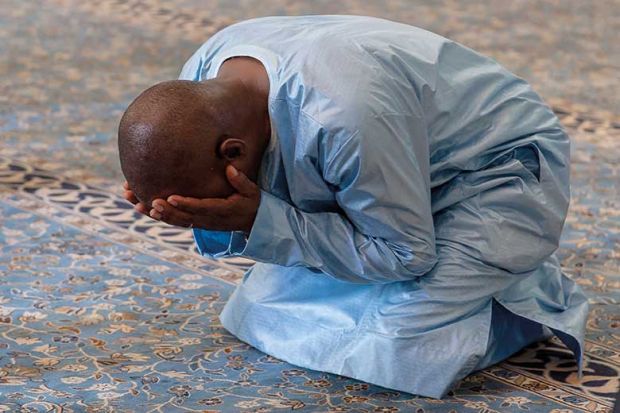A Gambian migrant scrambles ashore from a drifting boat that has brought him from Libya to the shores of Sicily. Lonely and hungry, he escapes the transit camp to which he is assigned and finds his way on to the streets of Catania, where he sleeps rough and scavenges for food on rubbish heaps. One day, he wanders into a police station, only to be headbutted and told to get out. A passer-by finds him collapsed in tears and takes him to the local mosque, where Akbar Ahmed and his team have just arrived on their journey researching Islam in Europe. Breaking down, he describes his experiences: “not easy, not easy…They don’t see nothing. No documents, no passport.”
Ahmed tells many such stories to remind us of the paradox of a comparatively affluent Europe that shows a lack of compassion for outsiders. Refugees are seen as a threat to European identity in the discourse of an increasingly active far right. We repeatedly meet those advocating a hard-line stance toward Muslim immigrants in particular, tarring them all as terrorists, flooding the continent in pursuit of an Islamic Caliphate at the heart of Europe.
Yet, according to Ahmed, such views ignore the shared history of empire and the centuries-old global connections that bind together Islam and Europe. Much of southern Europe is marked by the memory of the Andalusian moment of la Convivencia (co-existence), during which a Muslim dynasty ruled southern Spain from the 7th to the 13th centuries. For Ahmed, la Convivencia is a historical ideal of cross-cultural, interfaith cooperation. It is a touchstone in this narrative, which takes in Britain, France, Germany, Italy and Greece as well as a visit to the killing fields of Srebrenica in the company of those who lost loved ones in the 1995 massacre of Bosnian Muslims.
As the book acknowledges, the history of intercultural coexistence is in danger of being drowned out by intolerant purism. Ahmed’s interrogation of the far right draws on the voices of Jim Dowson, the founder of Britain First, Soren Esperson, the deputy chairman of the Dansk Folkeparti, and Michael Sturzenberger, the face of the Munich branch of Pegida. Journey into Europe is scrupulous about featuring these voices alongside those working for peace and greater understanding. Nor does it spare those Muslims who support terrorism.
The question of immigration and identity is at the core of this compelling book, presenting us with a complex picture of identifications that continue to shape Europe. Ahmed offers a solution to the current crisis: the integration of Muslims into European society through interfaith initiatives. He underlines the necessity of a cultural dialogue that must involve everyone from the Parisian banlieues to the Vatican. His latest study extends his commanding body of work on Islam. Journey into Europe – which is accompanied by a recent documentary film of the same name – offers vital insight into what it means to be Muslim today.
Amina Yaqin is senior lecturer in Urdu and postcolonial studies at SOAS University of London and co-author, with Peter Morey, of Framing Muslims: stereotyping and representation after 9/11 (2011).
Journey into Europe: Islam, Immigration and Identity
By Akbar S. Ahmed
Brookings Institution Press 592pp, £25.95
ISBN 9780815727583
Published 28 February 2018
Register to continue
Why register?
- Registration is free and only takes a moment
- Once registered, you can read 3 articles a month
- Sign up for our newsletter
Subscribe
Or subscribe for unlimited access to:
- Unlimited access to news, views, insights & reviews
- Digital editions
- Digital access to THE’s university and college rankings analysis
Already registered or a current subscriber?







